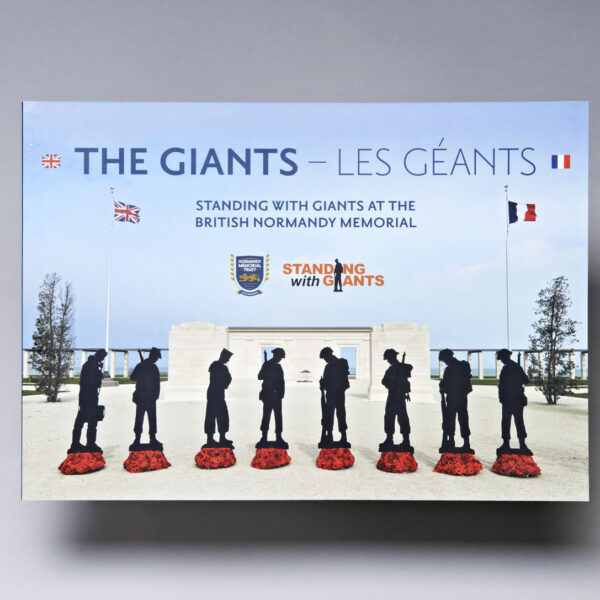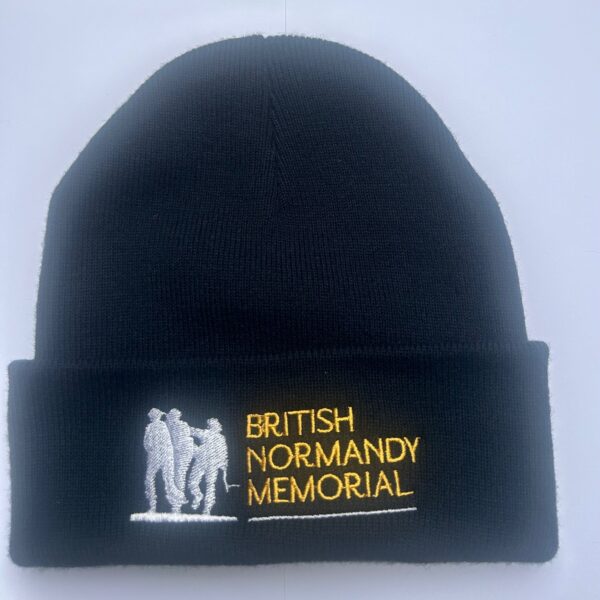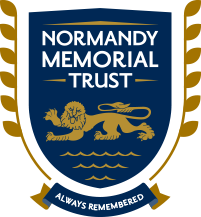Donald Thompson Wright
This story and photos are shared by the Trust courtesy of Chris Wright, grandson of Donald Wright. He wrote this to share a survivor’s story of the sinking of Hospital Carrier Amsterdam which hit a mine off the Normandy coast on the 7th August 1944. A number of people died, including two nurses, Anyta Field and Mollie Evershed, the only women commemorated on the British Normandy Memorial.
I will begin by saying that I never heard my Grandad speak personally about his First and Second World War war experiences (or any other unhappy past experiences, for that matter). I remember him being a jovial and charming man. But I know that he lived through some very difficult times in his life, some of which were too traumatic and too painful for him to talk about. He was also modest and would never have dreamt of singing his own praises regarding his wartime experiences.
So, I will give a little background to his life, in case it is of interest. My grandfather, Donald Thompson Wright was born in Lakenham, Norwich on 27th February 1899. His mother had been a lady’s maid to a wealthy family and, as often happened, fell pregnant – no doubt to a member of the family. She appears to have been paid off and sworn to secrecy. So she refused to tell Donald who his father was, which obviously created a rift with his mother, meaning that he was never especially home loving.
He left school at the age of 14 to work in the Telegraph Office at Norwich Station and, by the age of 16, he had left home completely and was working in the Telegraph Office in Colchester. He was conscripted in 1917 at the age of 18 and joined the Royal Naval Air Service (although he was only interested in the Navy). He trained in South Norwood in London, Chatham and on the East Coast, before spending most of 1918 at Scapa Flow.
Donald pictured in his early days in the navy
After WW1, because of his experience in the Telegraph Offices and in the Navy, he trained as a radio officer in the Merchant Navy. He appears to have originally been on the SS Malines, working on the Harwich to Antwerp crossing, as I have several postcards sent to his fiancée, Dora, back in Colchester in 1921.
He married my grandmother in 1922 and, when my father was born in 1925, my grandmother sent a telegram to Donald, at which time he was working on the SS Archangel. Otherwise, I am not sure on which other ships he might have been working. However, I am fairly sure that he was working on the SS Amsterdam very soon after it came into service in 1930 and stayed faithful to her for many years. Certainly, the family moved from Colchester to Parkeston Quay, Harwich, in the very early 1930s, as Donald was working as radio officer on the North Sea crossings from Harwich to the Hook of Holland. He could thereby walk to his ship from his house. In fact, I am certain that the vast majority of the crews on these crossings lived in the Harwich area, and there was a strong sense of camaraderie amongst them.
My over-riding impression was that my Grandfather really enjoyed the crossings and the general life on board ship. He clearly had many opportunities for socialising and even got to know the crime writer Dorothy L Sayers and her husband Mac Fleming, who were probably dining with him one evening at the Captain’s table. Donald was certainly a ladies’ man, with plenty of charm, and he made the acquaintance of several female friends during this period. (I still have his signed photos from two of three of them!). He was a good family man, but life on the Amsterdam and the extended periods away from home enabled him to live something of a double life. I doubt whether he was alone in this!
Donald stayed on as (first?) radio officer with the SS Amsterdam after the outbreak of war. The North Sea crossings came to a halt and the ship was quickly requisitioned as a troop ship. I have read an account of the SS Amsterdam taking troops of the 51st Highland Division and Princess Louise’s Kensington Regiment – part of the BEF force – from Southampton to Le Havre in April 1940. I am certain that my grandfather was the radio officer on that crossing.
He was then definitely the radio officer on the Amsterdam when it sailed to Dunkirk to rescue British troops. I’m afraid that I have no details about that trip because only my Aunt ever mentioned it to me, but I presume that they were able to bring a considerable number of troops back to England from France. After Dunkirk, I can’t be certain that my grandfather stayed with the Amsterdam during the middle period of the war but I suspect that he would have done. There are a lot of postcards to my grandmother sent in 1941 from Scotland, notably from Invergordon and Ross-shire which suggests he was back at Scapa Flow.
Then, on the 6th May 1944, Donald sent a postcard to my grandmother from Falmouth, followed by two very cryptic cards from Weymouth and Dorchester on the 17th May and 24th May 1944. The clear indication is that the Amsterdam was preparing for the Normandy landings and that the utmost secrecy was ‘de rigueur’. The ship, with my Grandfather as First Radio Officer, then sailed with the invasion forces on the 5th June from Weymouth Bay. They carried the American Rangers to the Pointe du Hoc. As far as I know, the Amsterdam returned to the south coast of England without sustaining any damage. My grandfather then stayed with the ship while it was converted to a hospital ship, becoming HMHS Amsterdam. I understand that, as from July 19th, it made perhaps two return trips to the Normandy coast before the fateful incident off Cherbourg.
My grandmother received two telegrams after the the sinking of the Amsterdam. The first was from Donald but there was no hint as to what had happended to him.
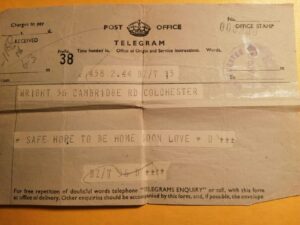
It was followed the next day by a telegram reporting that he had been injured and admitted to hospital whilst on war service.
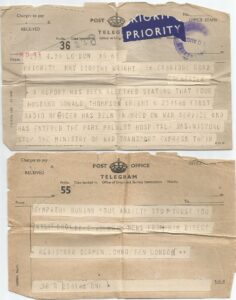
This is probably an appropriate point to say something about Donald’s relationship with Sister Anyta Field, one of two nurses who were killed when the Amsterdam sank. They were aged 45 and 32 respectively at the time. My father and his two siblings clearly thought that their father Donald and Anyta had been very close. I don’t quite know why, but perhaps it was their father himself who had given some hint. And he had kept the newspaper cuttings about her until his death in 1973.
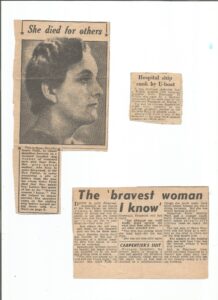
The news clippings that Donald kept about Anyta Field
Shortly after that my father managed to take the cuttings away from his mother who, when she saw them, had wanted to rip them up.
But now that I know a little more about the timings, I am just a little bit sceptical about the story, bearing in mind that there can have been very little time between Anyta joining the ship on, presumably, July 19th and the sinking, just two and a half weeks later. And, in any case, I would imagine that the atmosphere would have been completely different from a relaxed crossing from Harwich to the continent between the wars. Anyta, in particular, would have been ridiculously busy on the return crossings with a ship full of wounded soldiers.
However, on the night of 7th August Hospital Carrier Amsterdam hit a mine as she set off on her third journey back to the UK with wounded servicemen. After the ship had hit the mine and there was the explosion, it would have been Donald, as the First Radio Officer, who dashed to the Radio Room and sent the MAYDAY call. I also have the impression that, given that the ship was already on its side when he slid down the hull, Donald must have been one of the last crew members to successfully escape the ship.
My Grandfather kept the trousers of the uniform that he was wearing when he made his way into the water. They were of particular interest
because the seat and the backs of the legs were stained with paint from the ship’s hull. I believe that it was a light-coloured paint, possibly greyish. For it to stain, I presume that the paint was relatively recent.
We also have this montage of a portrait of Donald, the Amsterdam and what we believe are photos of the location where the Amsterdam was after she capsized.
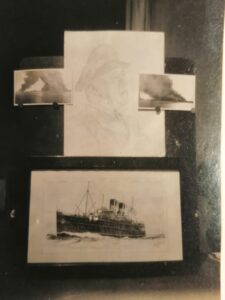
As far as the events of 7th August 1944 are concerned, this is part of a letter that my Grandfather wrote to my father, Peter, on the 25th August and which reveals so much in just a few lines……
Dear Peter.
Am feeling pretty fair, but have trouble to get to sleep at nights, mother’s snoring doesn’t help much. Yes, it was a ghastly business seeing the old girl go down, she was almost on her side when I slid into the drink and swam like ‘L’ to get away. We were picked up after about an hour, managed to rescue 75% of the wounded, but unfortunately lost about 1/3 of our crowd. Cranfield has gone, also Mango, do you remember him?
We were eventually put on board a cruiser where they treated us royally, reviving us with a hot bath and whisky, after that we were transfered to a hospital ship and landed to go to hospital for four days suffering from shock and exposure, before we left the sisters were suffering from shock. Dr Armitage has done me quite a lot of good, we went up there to tea on Sunday, had to almost carry Mum home.
Have got until the 13th September, what will happen after that remains to be seen. Well, Peter afraid this is all I can muster for time being……
So, there’s a little humour, grief for long-time fellow crew members from the local area, a great deal of affection for the ship, evidence of post traumatic stress, references to alcohol (Dr Armitage was not a doctor but a sherry salesman!), the probability that he didn’t even make it into a lifeboat and just trod water for an hour, details about how they were rescued and then about the recovery (which was in Park Prewett Hospital, Basingstoke).
Apparently he returned from the hospital to his home in Colchester looking haggard, dressed in ill-fitting old clothes that they found for him in the hospital. He was always immaculately dressed, so his appearance was a shock to the family and perhaps to Donald himself. As far as the post-traumatic stress is concerned (not that it was called any such thing at the time, or even properly acknowledged), his children all felt that he was a different person after the sinking. He used to have nightmares for years afterwards. And, for example, he couldn’t stay in the house during air raids. He used to go for long walks around the local streets, rather than endure the feeling of being trapped indoors. In fact, as his service record reveals he didn’t go back to sea until he joined the SS Prague in Southampton on 14th November 1944. Significantly, he is now the 2nd Radio Officer, and remains so until after the end of the war.
Subsequently, the new version of the SS Amsterdam was built and came into service, and Donald joined it in Glasgow on 25th May 1950.
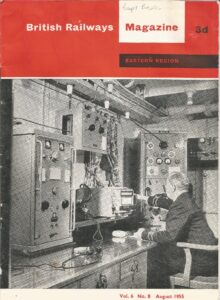
Donald, pictured in the Radio Room, for the August edition of the British Railways Magazine, 1955
He served on it continuously as Radio Officer on the Harwich to Hook of Holland crossing until his retirement in 1964.




